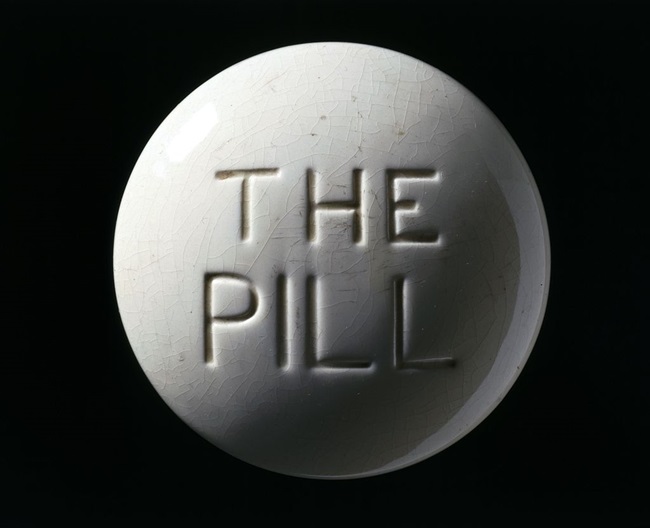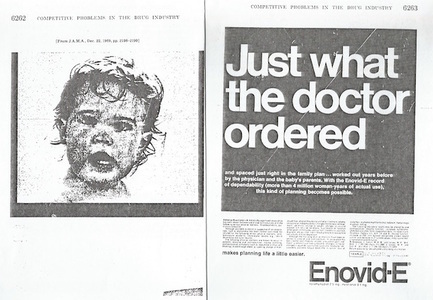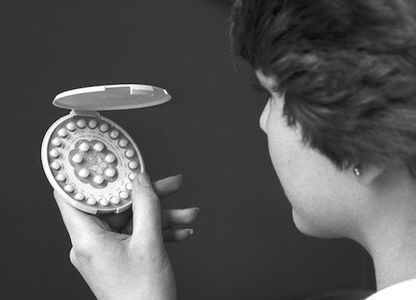“Estrogen is to cancer as fertilizer is to the wheat crop.”
It was the first headline-grabbing quote from the Nelson Pill Hearings, and it threw birth control proponents into a tizzy. They complained vociferously that the hearings were alarming women everywhere, and causing them to stop taking The Pill. Senator Nelson’s reply was simple, if women had been warned about the side effects before being prescribed, they wouldn’t be alarmed hearing it now.
That one little quote about synthetic estrogens catalyzing cancer and the uproarious reaction it inspired epitomize the beauty of the hearings. It was one of the few times in recent history that the pharmaceutical industry had almost no control of the message.
Hormonal Birth Control: Fertilizer for Breast Cancer
Prior to the hearings, Big Pharma managed to suppress knowledge of their product’s link to certain cancers, particularly breast cancer. However, in the hearings, those connections came to light, and stunned viewers as they tuned into the nightly news. (Perhaps I should inform my younger readers that this was a time when our country only had three networks, none of which featured a 24-hour news cycle. Consequently, the nightly news was still a pretty big deal).
Here’s a breakdown of some key facts presented by leading physicians in those hearings:
- The American Cancer Society recognized the possible risk of breast cancer as a side effect of hormonal contraceptives as early as 1961. – Dr. Max Cutler, Page 6664
- It’s imprudent to prescribe oral contraceptives to a woman with a family history of breast cancer. – Dr. Max Cutler, Page 6666
- There was statistical evidence that breast cancer associated with pill takers in the FDA files had been dramatically underreported. – James Duffy, Page 6069
- All human carcinogens are latent. And, it could take 10 to 20 years of patient history to determine the cancer impact. – Dr. Victor Wynn, Page 6309
- Not only had the synthetic hormones used in The Pill been proven to cause breast cancer in all five species of animals that had been injected with it, but it also caused the very rare condition of breast cancer in human males. – Dr. Hugh Davis, Page 5927
- There should be no chronic use of The Pill. It is a cancer time bomb with a fuse that could be 15 to 20 years. – Dr. Max Cutler, Page 6669
The most important statement as it relates to us today came from Dr. Hugh Davis:
“Now, there are some 75 to 80,000 women in this country per year who are developing diagnosed carcinoma of the breast. If the chronic taking of steroid hormones eventually increased this by only 10 percent, we would have a very, very hazardous situation on our hands…” (Monopoly Subcommittee, Page 5931)
I know how easily our eyes can glaze over when someone starts quoting statistics, but please pay attention to these numbers. In 1970, 1 out of every 20 women developed breast cancer sometime during her life (Dr. Max Cutler, Page 6666). You just read that Dr. Davis said it would be ‘a very, very hazardous situation’ if we saw a long-term increase of 10% over the 75 to 80,000 diagnoses each year.
Today, we have witnessed a 210% increase; 1 in every 8 women will develop breast cancer in her life. Over 246,000 cases of breast cancer will be diagnosed this year. If the vastly underestimated 10% was considered very hazardous, then our reality hit a level of hazard that defies description.
Message Control
The hearings also pulled back the curtain on how the pharmaceutical industry manipulated the message to the media and the medical community.
In 1967, Child & Family Quarterly started a section called, “Recent Setbacks in Medicine,” which seemed to be largely inspired by the introduction of hormonal birth control. Here’s what they had to say:
The Pill quickly became big business, so that drug manufacturers began to manipulate professional opinion at an early date, stressing the wonders of the Pill and minimizing its dangers.
Speaking to this point, Sen. Nelson pointed out the conflicting statements of Dr. Louis Hellman, who chaired the FDA’s study on The Pill. He said:
I doubt whether there is one person, one doctor in a thousand in this country who is aware that [Dr. Hellman] said, “Now, in discussing the chairman’s report, the right statement has to be made. We cannot just hide behind rhetoric. We are going to have to say something, and we have an opinion; that these are not safe, and the Commissioner might have to take them off the market if he believes this. We can say these are safe and our scientific data did not really permit that kind of statement.”
The FDA committee’s official statement ended up being that hormonal contraceptives were “Safe within the intent of the legislation.” This strangely mitigated reference to Kefauver-Harris legislation was all the pharmaceutical industry needed because it contained the word ‘safe.’ Despite admitting they were of the opinion that The Pill wasn’t safe, Dr. Hellman then hit the media circuit to reassure women everywhere that it was.
Further evidence that Big Pharma was seizing control came in the testimony of Dr. Edmond Kassouf. He read the Senators an unnerving conclusion to a New York Times review of Barbara Seaman’s book, A Doctor’s Case Against the Pill. Reviewer, Christorpher Lehman-Haupt wrote, “One wonders why the drug companies have been so exercised about it. In a way, their attempts to warn book reviewers against it are more disturbing than the book itself.” To which, Dr. Kassouf responded:
Mr. Lehman-Haupt has performed a public service in exposing the drug companies’ attempts.
Cures Not Causes
At Big Pharma, manipulation is the modus operandi, but no example is more disgusting and deplorable than Breast Cancer Awareness Month. Yes, that is what I meant to say. Let me explain by first asking you a question. If an organization started promoting Lung Cancer Awareness Month but they never mentioned smoking, would you think there was something fishy in the air?
For all this search for the cure, there is no talk of avoiding the cause. There’s a good reason for that. Jim Hightower festoons the irony amusingly in his book, There’s Nothing in the Middle of the Road but Yellow Stripes and Dead Armadillos.
Breast Cancer Awareness Month is a front that was conceived, funded, and launched in 1985 by a British conglomerate with a name that could come straight out of a Batman comic book: Imperial Chemical Industries. But the $14-billion-a-year multinational behemoth is all too real. It is among the world’s largest makers of pesticides, plastics, pharmaceuticals, and paper. “Organochlorines R Us” could legitimately be its slogan, though “Pollution R Us” would also fit – one of its Canadian paint subsidiaries, for example, has been held responsible for a third of the toxic chemicals dumped into the St. Lawrence River.
In 1993, Monte Paulsen of the Detroit Metro Times wrote, “ICI has been the sole financial sponsor of BCAM since the event’s inception. Altogether, the company has spent ‘several million dollars’ on the project, according to a spokeswoman. In return, ICI has been allowed to approve – or veto – every poster, pamphlet and advertisement BCAM uses.”
ICI’s pharmaceutical division, Zeneca Group PLC later split off to become AstraZeneca, taking Breast Cancer Awareness Month with them. Kudos to Mr. Paulsen for digging into this. Most journalists who know about AZ’s ‘ownership’ of BCAM see the move as philanthropic. AstraZeneca can’t lose. They actually strategized a way to make breast cancer a win-win situation for their shareholders.
Jim Hightower continues:
It gets gooier. Zeneca’s pharmaceutical arm is also the maker of Nolvadex, the leading drug used in breast cancer treatment. Nolvadex is a highly controversial drug – it does not cure existing breast cancer, but it can help stop it from spreading in some women who are diagnosed early; however, it can also cause blood clots, uterine cancer, and liver cancer in those who take it… What a racket this company has going! It make billions selling industrial organochlorines linked to breast cancer, it finances its BCAM front to divert public attention from cancer causes to cancer detection, then it sells Nolvadex to those who are detected.
Industrial waste and toxic chemicals may be responsible for the spike in breast cancer; and synthetic estrogens may be the fertilizer that feeds it, but, ultimately, it’s Big Pharma that’s spreading the manure.

The FDA approved The Pill despite it not being proven safe. Today, it has been linked to everything from blood clots and cancer to lupus and Crohn’s disease — and still has not been proven safe.
This book explores the medical and historical disconnects that brought us to this point.
Last updated on October 21, 2023 at 9:38 pm – Image source: Amazon Affiliate Program. All statements without guarantee.
We Need Your Help
More people than ever are reading Hormones Matter, a testament to the need for independent voices in health and medicine. We are not funded and accept limited advertising. Unlike many health sites, we don’t force you to purchase a subscription. We believe health information should be open to all. If you read Hormones Matter, like it, please help support it. Contribute now.






























